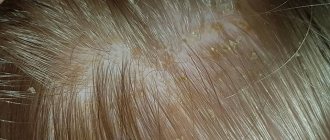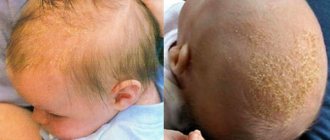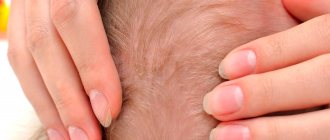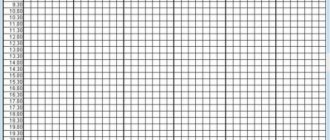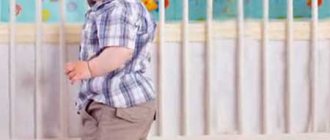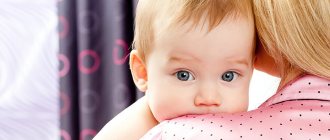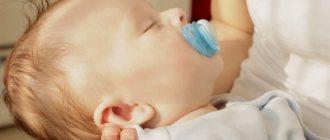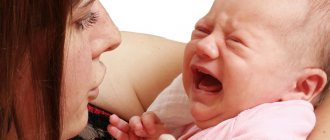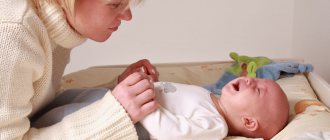Reasons why a child hits himself on the head
A 1-year-old child hits himself on the head in protest
In infancy, children are submissive to their parents and completely submit to their will. But already at the stage of growing up, starting from the age of one year, the child can show his protest against the wishes of the parent. This is how the quality of a child’s leader, his exactingness, is revealed. And if the child is not ready to put up with failure, with his parents prohibiting him from doing anything, then he hits himself as a protest.
Such an aggressive reaction may indicate excessive prohibitions and refusals on the part of parents. Parents should think about the principles of education. In such a situation, the child seems to be trying to cope with his humiliation by using force against himself.
It would be a big mistake to respond to a child’s aggression with aggression: shout, physically punish. The result will be: even greater fear of the child, severe crying, hysteria.
The right thing to do is: Gently hold the child’s hands from hitting him, sit next to him, hug him, take him in your arms. Say the child’s feelings out loud, that is, help him understand himself: “I didn’t allow you to watch the cartoon, so you were very upset. Let’s first collect the toys, and then watch an interesting cartoon together.”
Advice: parents need to look at the principles of upbringing from the outside. How many “no” and how many “yes” do you say when communicating with your child? Parents themselves must first of all be able to make compromises.
Children hit themselves when they feel guilty
This is the opposite option from the first. If in the first case the baby showed disagreement and struggle, then here he feels guilty, bad and “not as he should be.” These are children with a weak nervous system.
The reason for this is the upbringing of parents, in which they constantly verbally shame the child, scold him, compare him with “better” children, and give him offensive nicknames. That is, if a child has done something bad and knows that his parents will not like it, he begins to scold himself and punish himself for the offense.
When a child hits his ear, it means that it is unpleasant and painful for him to hear something. And he cries after he punishes himself, from the pain that he inflicted on himself.
The wrong reaction of parents: ignore such self-flagellation of the child, lock him in a room, react aggressively. As a result: the child is only convinced of his own inferiority, stupidity, and inability.
The correct reaction: explain to the child that even if the parents are angry, they still continue to love their baby. No amount of bad behavior from a child can make you stop loving him because of this. It is important to let your child know that you will never turn your back on him.
Advice: try not to express out loud excessive criticism and your dissatisfaction with your child. When making a comment, immediately explain how you can fix it or do it better. Offer your help if the child needs it.
One year old child hits himself on the head to get what he wants
Our children are still manipulators. We could learn from them. They manipulate us to get attention and love, to get what they need, to make us feel guilty and sorry for the child. A child at the growing stage takes an example from his parents; he learns everything by looking at us. That is, if the parents are used to pleasing their precious one in everything, then the baby is not used to not getting what he wants. As soon as the child becomes capricious, the parents immediately feel guilty and run to fulfill the child’s wishes, just so that the baby smiles again. Instead of consistency and firmness in educational decisions, we give up.
As a rule, it will look like this: the child hits and freaks out, but at the same time carefully monitors the reaction of the parents. Isn’t it in vain that he’s giving a concert here? Do parents see this?
A mistake in parental behavior: immediately handing everything to the child on a silver platter. Show exceptional gentleness and tenderness in upbringing.
The correct thing to do in this situation would be: without looking up from your work, ask the child what he wants to say. Don't show your complete involvement in your child's problem, but explain that it is important for you to understand why he is angry. You can also try to distract the child, or even leave the room for a while.
Advice: parents need to think about the boundaries of what is permitted for the child (do they even exist?). Learn to distract your child from his problem, prevent hysteria before it starts.
I would like to remind all of us: our children look up to us and learn everything from our example. Therefore, it is very important for us to be worthy of our children.
2 year old child hits himself on the head to get your attention
Why does a child hit his head on the floor or wall when he freaks out?
Causes of blows to the head
What does it mean if a child hits his head? It's hard not to panic at the sight of a child desperately pulling at his own hair or hitting his own head.
Sometimes it seems that a little more and the baby will be left without part of his hair or cause himself a serious injury. What to do in such cases and how to understand what causes such frightening behavior?
Why do children hit their heads on purpose? The most common causes have nothing to do with pathology in the body or development.
What can provoke such behavior, but should not be a cause of great concern on the part of parents:
- Self-knowledge . It is already difficult for an adult to realize that once upon a time he did not understand the connection between the blow of his hand on, for example, his own forehead and the immediately arising sensations on the scalp. But it is through touch that we learn to perceive this world. Therefore, there is nothing wrong with a baby patting itself on the face or hitting its own head with small fists. In newborns, in general, coordination of movements is still very weak. And waving their hands in front of their faces, they are simply trying to rub their eyes because, for example, they want to sleep.
- Banal fatigue. In an effort to get rid of fatigue that irritates the psyche, the child, most often lying down, shakes his head from side to side, imitating the sensations he gets from motion sickness. In his mind, this movement is directly related to the onset of sleep.
- A poorly developed vestibular apparatus in a child who is beginning to learn to move independently sometimes leads to tables, chairs and other furniture crossing the road every now and then. Therefore, head impacts can be provoked by the fact that you also need to learn to control its position during rapid movements. Hysterics. During a violent manifestation of dissatisfaction with the behavior of their parents, it is most convenient for children to lie on the floor and hit it with all moving parts of their bodies. But, as a rule, this does not lead to serious injuries; more damage goes to the psyche of others who are forced to observe the process. As soon as the baby receives a noticeable pain response from the interior to a sudden movement, the desire to continue self-harm will greatly decrease. The disappearance of the audience from the horizon of the production leads to the same result. If it is difficult to tolerate such behavior indifferently, you can hold the child in your arms and talk to him in a calm tone until he calms down.
- Clarifying the boundaries of acceptable behavior. Having determined and learned through experience that the adults caring for him agree to give in to the child if he begins to harm himself and in fact is just pretending, the child will resort to this practice at every opportunity. Lack of interest on the part of parents in showing dissatisfaction usually gradually weanses the practice completely.
What should you pay attention to?
Cases that really require increased attention from parents:
- Deficit of parental attention. Emotionally cold or busy parents have children who lack hugs for no reason. Therefore, in order to receive a portion of attention, kids do any actions that they are already able to do in order to be loved, pitied and simply stroked and hugged.
- Painful sensations in the ear or gums . Tapping your head on a hard surface dulls the unpleasant symptoms of inflammation caused by otitis media or teething. But it is rarely not accompanied by prolonged periods of crying. Therefore, if active shaking of the head is interspersed with tearfulness, then they are not manifestations of whims, but a signal of poor health.
- Intracranial pressure . The discomfort felt may be the cause of atypical head movements, so that shaking reduces painful manifestations. If the birth was difficult or the child subsequently developed diseases that could affect blood circulation in the brain, then it is better to once again consult with a pediatrician about the child’s tendency to bang his head.
- Auto aggression . When it is impossible to have a full dialogue with parents, when children have no right to vote at all and are afraid to show not only obvious protest, but also simple human emotions, hitting themselves is a way of demonstrating psychological discomfort. In addition to the mandatory consultation with a psychologist about the child’s condition, behavior correction sessions are also necessary for adult members of the child’s family. Usually, a sensitive blow to the body in any part of it sobers up the baby and he, if able, strives to avoid repeated painful contact. If a child does not stop in the process of self-injury and brings the situation to the point of bleeding wounds appearing on the body, then this indicates a serious mental disorder. And you can’t do this without consulting a neurologist and psychiatrist.
Why does my baby pull out his hair?
If this practice is observed in a child under one and a half years old, then, in most cases, the reason is the typical reflex of children to hold in their hand everything that comes into their palm.
As a result, from the outside we see a picture when a baby with hairs, the length of which allows him to grab onto them, pulls himself by the strands because they got in the way of his hands, and the poor relatives think that the baby, as they say, is tearing and throwing about for some reason -That.
Possible reasons requiring medical intervention and control over the situation:
- Itching due to diathesis, insect bite, allergy to something, healing abrasion. It is possible that the baby is not able to reach the problem area to scratch himself, and pulling himself by the strands reduces the manifestations of the irritating factor. Sometimes this reaction is associated with an inconvenient accessory (elastic band, hair clip, headband) or excessive prickly headgear.
- Intracranial pressure, headache, toothache, ear pain are the same reasons as in the case of head banging.
- Mental and developmental disorders.
He does this when he's angry or freaking out.
If developmental pathology is excluded, then this is simply a manifestation of a strong temperament.
It is possible that even a hereditary trait or acquired due to the fact that one of the adults in critical situations acts in exactly the same way, and the child is present at the same time and later copies the behavior.
If neither you nor your significant other likes to hit your forehead in critical situations, take a closer look at the behavior of people who are with the child.
It is possible that one of them likes to hit himself on the head in moments of excitement, insight, or solving a difficult problem.
Is this normal for one-year-old children?
A child is one year old and he hits his head on the floor or wall: is this normal? It was already said above that most often this is not a symptom of a serious problem. However, in each specific case you need to act according to the situation:
- If the reason is constant overexertion, then you need to extend the time of getting ready for bed, give up particularly active games two hours before going to bed, and start practicing baths with soothing herbs if the child likes to swim.
- Alignment of the wall against the background of attention deficit is a signal to the mother that she is paying little attention to the baby.
- When trying to put pressure on parents, one can and should ignore such behavior. At the same time, keep your finger on the pulse in such a way that the child does not realize that he is being monitored.
- If punching a hole in the wall or floor is interspersed with bouts of unreasonable crying, then self-harm behavior is most likely caused by pain in the body.
- Behavior that is unusual for a child, for example, prolonged freezing in one position with his gaze focused on one point, an acute reaction in the form of head-banging after someone from the environment addresses him, may be a manifestation of one of the forms of autism.
How to wean yourself from such actions?:
A child with a healthy psyche will not harm himself on purpose. Therefore, you need to identify and eliminate the cause that causes the behavior that frightens you. Then the unpleasant habit will definitely remain a thing of the past.
Source: https://rucheyok.ru/rebenok/chto-delat-esli-rebenok-betsya-golovoy
How to stop a child from hitting himself
Most often, parents themselves can cope with the child’s aggressive condition. But there may also be cases when specialist intervention is required. It is important not to confuse an ordinary whim with an emerging disease.
Methods to stop a child from hitting himself
• Maintain contact. For a child, the most important thing at the growing stage is communication with his parents. Does your child trust you? Do you give him the opportunity to be frank with you and not be punished for it?
• Your caring calm in response to the child’s aggression. Try to remain calm around a screaming child. Try to talk to him and clarify the situation. Don't scold or shout.
• Don't give in to your child's whims. That is, if you said that this is impossible, and after a tantrum you said that it is possible, the child draws a conclusion: he beat himself, shouted, achieved his goal. This means it works for you and will happen more than once. Again, try to explain to him why this is not possible, but be sure to offer an alternative.
If a child plays calmly, and then at some point begins to hit himself on the head or hit his head on the floor without crying or screaming, and then returns to playing, this is not a good sign. There may be a psychological illness or nervous disorder. Be sure to consult with specialists. It is very important not to start the development of the disease, if it exists at all.
Talk to your children often. The child should get into the habit of sharing his problems and experiences with you. Create an atmosphere of support and trust in the family, and, importantly, fairness to the child.
Bad parenting or nervous disorder: what to do if a child hits his head against the wall
The reasons why a baby hits his head, causing harm to himself, can be different - from banal pampering to serious health problems. Let's figure it out.
If you notice that your child is banging his head against hard objects (usually a wall), don't turn a blind eye. And especially do not try to resort to physical punishment. Yes, perhaps we are simply talking about bad behavior, but in some cases this may also be a signal of a psychoneurological disorder.
Why does a child hit his head against the wall? In what cases will a child psychologist help, and in what cases should you urgently go to a neuropsychiatrist?
The reasons for this behavior can be extremely varied. After all, we observe only a symptom, but do not see the underlying reasons that provoke the child to such actions. Let's start with the simplest.
The cause of mental stress in a child can be frustration from an action he has committed: he broke a cup, did not defend his toy... Sometimes children try to relieve this tension with the help of pain - physical pain covers up psychological pain.
This is a warning sign that requires your attention. Indeed, depending on the age, the child should be able to cope with his experiences in other ways, for example:
- share your experiences with your parents,
- seek support from close adults,
- just cry.
If he doesn't do this, then the question arises: "Why?"
Maybe his relationships with adults are broken and he has long lost hope of being heard?
Who should I contact? In this case, it is worth contacting a child psychologist in order to change the relationship between the child and close adults to more favorable ones.
In what cases should you consult a doctor?
If your child begins to regularly throw tantrums at you and beat himself, you tried to have explanatory conversations with him, but nothing helps, then in this case you need to contact a specialist in the child psyche.
In addition to the fact that the child hits himself on the head, he also:
- Begins to transfer his anger to others.
- Wakes up at night from nightmares.
- He begins to lose consciousness.
- Chokes during hysterics.
- He starts vomiting.
If you observe one or more of these symptoms, it is better to consult a specialist, and urgently.
Well, that’s all I have for today, take care of your children, do not create a tense situation in the family, so as not to traumatize the child’s psyche that has not yet formed.
Why does a 1 year old child hit himself on the head?
To help your child get rid of an unpleasant habit, you first need to understand its causes. Parents should not panic or be afraid that their child will harm their health. Remember that most children with this habit are actually healthy and do not have any pathologies.
Often this action is associated with the baby’s high emotionality and irritability; the psychological situation in the house can also affect it; perhaps the baby doesn’t like something. In this way he will show his dissatisfaction.
Reasons for this behavior at the age of one year:
- Lack of attention from adults . In this way, the baby can attract attention to himself. He realizes that his behavior will excite adults and they will spend a lot of time next to him, catering to all desires.
- A way to relax . Surprisingly, in this way the baby can calm himself down, the baby makes rhythmic movements and relaxes.
- Expression of emotions . A one-year-old child does not yet know how to correctly express his emotions, convey his frustration through words, so he tries to calm down and throw out his negative feelings.
- Ear pain . A one-year-old baby will not be able to tell his parent that something hurts. Perhaps he has an ear infection or teething syndrome, so he hits himself to numb the pain and show his mother that he is sick.
- Sign of illness . Sometimes this is how developmental deviations manifest themselves. To talk about the presence of a serious illness, consultation with a qualified doctor is required.
- Hyperactivity and intracranial pressure . Regardless of age, the cause may lie in increased intracranial pressure or simply in the baby’s hyperactivity. To exclude such factors, you should visit a specialist.
The child is angry
When a child is angry, he may scold himself in the shower or strike. Why and what can a little person be angry about?
This is how he can react to the lack of attention from his parents, for example, when a second child was born in the family, the first child began to lack attention. They tell him: don’t touch, don’t interfere, don’t interfere. The child is offended that they do not trust him, but over time, in response to the desire to touch his brother or sister, he will instill in himself the same words and even use physical force on himself.
An aggressive reaction to oneself appears in children who grow up in a family where assault and moral violence occur. The child’s psyche is formed taking into account negative manifestations; the baby begins to beat himself first, and then others.
Children begin to get angry during periods of age-related crises: three, seven years. While strenuously proving to the world the importance of their own personality and independence, the guys are faced with misunderstanding and rejection of their new status. Unable to move the parental wall, the child shows anger and aggression.
How to communicate with a child correctly?
If your baby hits himself on the head, be prepared to interact with him in a special way. You will have to learn to restrain yourself in some moments, show patience and be sure to be calm. Children should not see your worries and worries.
Do not scold your child, do not show aggression in response
If a child hits himself on the head when he’s angry, don’t get angry and don’t allow him to swear. This will only make the situation worse. Children are very susceptible to rudeness from their parents, so they will protest even more.
The fact that he is always scolded for any offense will be recorded in the baby’s psyche. Because of this, in the future he will automatically begin to punish himself for some of his mistakes. This behavior can become chronic and will not lead to anything good. Therefore, try to be tolerant of your children, restrain your anger, and do not allow rude words towards them. Although the baby protests, he still expects support and kindness from you.
Never tell a child that he can’t do anything if he doesn’t succeed at something. In this way, you will only lower his self-esteem, and will not create an incentive to learn. If something doesn’t work out for the kids, be patient and show them how to do it.
Teach your child to voice his feelings and desires
If a child hits himself on the head at 2 years old, try to teach him to express his emotions differently. Always give free rein to your children in this regard. They must understand that they have the right to talk about what concerns them. It is important that children are not afraid of this.
When a child is angry, he is able to express this emotion in different ways. But it is important for you to benefit from this situation, so that it teaches the baby something and helps develop the most trusting relationship with his parents. Therefore, do not try to drown out the child with rudeness, retaliatory manipulation and other negative methods. Let him know that you understand him, that you are ready to listen to all grievances and help him find a way out.
How to teach a child not to be silent about his feelings? Try the following algorithm. So the baby is angry. Your actions should be as follows:
- First of all, don’t panic or swear. Remain calm and attentive. Believe me, the absence of a violent reaction will definitely be noticed by the child.
- Ask your child to express his emotions. If you give him this right, he will understand that he does not have to hide his feelings.
- When a child speaks, do not interrupt, but listen carefully to him and periodically confirm your attention with words like “yes”, “good”, “understood”, etc.
- Do not try to quickly console the baby or lecture him in response.
Having expressed everything and not heard swearing in response, he will understand that he has the right to talk about his feelings and can tell you about them at any time. This will help the child in the future learn to find a way out of any difficult situations that they may encounter.
Ignore manipulation
Child manipulation is the child’s ability to influence his parents. Don't give him this opportunity. If you continue to be led by whims, then in the future he will grow up with incorrect life attitudes.
The ability to manipulate people is very firmly part of a person’s character. With age, this skill only becomes stronger. And it’s scary to think what tricks a child will be capable of in a few years to get what he wants.
It is much more difficult to deal with an adult manipulator. They try not to deal with such people and walk a kilometer away. Therefore, your child runs the risk of being left alone and will find it difficult to get along in a group. After all, you can win the attention of others through manipulation only in childhood, but not in adulthood.
Therefore, if your child hits his head on the floor when he freaks out, you need to deal with it. Don't give in to his manipulation. No matter how sorry you feel for your baby, do not pay attention to him during the next tantrum. Ignore such antics, but don't overdo it.
If you stop interacting with your child completely, it can cause him to have a strong fear that his family has rejected him. For a child, ignoring is the desire of the mother or father to completely abandon him. Therefore, panic arises.
Parents themselves do not notice how they manipulate this children's fear in order to stop hysterics. At such times, children are very worried and try to do everything possible to please mom or dad. They also stop expressing their emotions, which is bad, since all the negativity is kept inside. Therefore, you should not use ignoring as the only way to solve the problem and overdo it. Just let the little manipulator understand that his behavior does not affect you in any way, which means he will not be able to achieve what he wants.
Treatment with the help of a psychologist
If you can’t cope with the problem on your own or the baby is over three years old and the behavior does not change, then you should seek the help of a psychologist. He will not only help you find the causes, but also, if necessary, prescribe appropriate treatment.
Treatment methods:
If the child feels well
, development meets all standards, then over time the habit will disappear. However, if after three years it persists, you should consult a pediatric neurologist.
Remember, even if your baby has outgrown the habit of hitting himself on the head, you must not forget that he had it. Teach him to behave correctly in stressful situations, overcome feelings of guilt and resentment, and cope with difficulties. Then your baby will grow up to be a healthy person, with a stable character and the ability to behave in different life situations.
Question from Gulnara, Krasnoufimsk:
Answered by Tatyana Sosnovskaya, teacher, psychologist:
Hello, Gulnara!
You are absolutely right to stop using physical punishment on your child. Modern children need to be raised using modern methods, taking into account their natural characteristics, desires and capabilities. , this has extremely negative consequences. But what to do when a child hits himself? Why is this happening? Let's try to understand this issue with the help of System-Vector Psychology by Yuri Burlan.
For every child, parental beating is stressful. But different children react to this stress differently. A child with a cutaneous vector feels pain most acutely from physical punishment; his thin, delicate skin cannot withstand such harsh influence. With systematic punishment, to adapt to stress and to extinguish pain, the flexible psyche of the skin child begins to produce natural opiates. A paradoxical reaction occurs: after pain it becomes pleasant! Gradually, a person begins to receive subconscious pleasure when he feels bad and in pain. This is the mechanism for the formation of the so-called masochistic scenario in the skin vector and lies the reason why the child beats himself.
Some parents and educators even note a trend: such children seem to deliberately provoke adults and “run into” punishment: they deliberately break the rules, disobey, and become hooligans. At first, such behavior can be confused with the independent behavior of a child with a urethral vector, but they are fundamentally different. The urethral person simply does not care about prohibitions; he is less likely than others by nature to need parental care.
When a child hits himself, he, as if punishing himself, receives his distorted little pleasure through the initiation of pain on the skin. Until the child grows up, his psyche is developing, so everything can still be corrected!
There are children who hit themselves on the head or bang their heads quite hard against the wall. These manifestations can be observed in children of a fairly early age, up to a year. The reason for this behavior is different - this is a serious symptom of the beginning of trouble in the development of the sound vector. This is the topic of our next article.
If such auto-aggression is auditory, then for boys with the cutaneous-visual ligament of vectors, sacrifice may be characteristic - I will hit myself. It is these children who become outcasts at school, whom everyone pecks and bullies.
And here, in addition to the skin, it is very important to understand the state of the visual vector and its correct development. A child with an anal vector, very dependent on his mother, her opinion, obedient and driven, can beat himself, wanting to please his mother
“I will do everything as you want, even punish myself, just love me.”
That is, the same behavior of a child can be dictated by different internal states and their causes. You can understand them by well understanding the child’s psyche. You can learn this at the full training on system-vector psychology by Yuri Burlan. And in this article we will dwell in a little more detail on one of the possible aspects - the characteristics of the reactions of the skin vector.
Why do parents beat their children?
All adults, with rare exceptions, love their children. And yet, the tradition of corporal punishment remains in the 21st century, when so many works have already been written on this topic. Beatings are painful, humiliating, and insulting, but mothers and fathers continue to resort to them. And we are not talking about alcoholics and marginalized people, but about quite prosperous families.
Psychology has an explanation for this:
- Traditions. When dad, and grandfather, and great-grandfather were spanked, parents do not know how to punish differently. At a moment of stress, when a child does not obey, the memory of generations emerges, and the person acts according to a familiar scenario.
- Severe stress when the animal nature predominates. For example, severe pain if a child bites or kicks with his leg so that stars flash before his eyes. Strong fear when a child rushes, laughing, towards the road. Powerlessness when you speak and he doesn’t hear. At such moments, mechanisms associated with aggression are activated.
- Poor vocabulary, insufficient education, including psychological education. The parent does not have enough words, arguments and knowledge, and spanks on the butt are used.
- Feeling of own insignificance. A child is a dependent creature, and the parent often takes out anger, irritation, and dissatisfaction on him, which he cannot express to his offender. Children are affected by their fathers who are oppressed by their bosses, their mothers who are oppressed by their fathers, and their older brothers and sisters who are punished by their parents.
- Psychical deviations. There are times when parents raise their hand not out of stress or anger, but out of a cool head. They warn the children in advance that in the evening there will be punishment with a belt, they show it out and beat them almost with pleasure. Such people need to visit a psychotherapist, and perhaps a psychiatrist, to understand the causes of destructive behavior.
The desire to solve a problem by force sooner or later appears in any, even the most loving parent, and this is normal
It is important not to blame yourself for such feelings, because guilt gives rise to even greater internal demons. But that’s why a person is called reasonable, because he is able to fight rash impulses
